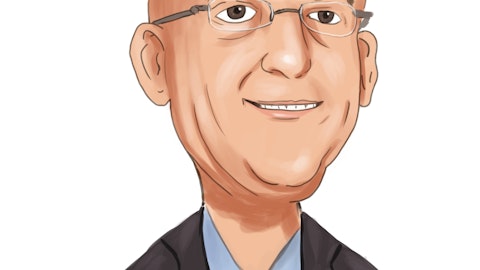Reni Benjamin: Hi, good afternoon, guys. Thanks for taking the questions. And congratulations on the progress. I guess I’d like to just kind of start off, start off. You mentioned patient A, patient B and patient C I’d love to just kind of get your thoughts maybe from Ken or Sara if she’s on as to one reasons for potential relapse, is there any work or anything that you might be able to gather from interacting with the patient or any of the biomarker studies that might give you some clues as to that? And then the other kind of related to it, more on the combo side is you have these objective responses like the PRs, but have you observed, I think you did in the monotherapy portion of the study, a deepening of response where SDs are becoming PRs and what is driving those kinds of responses? And then I have a follow-up.
Ken Pienta: So this is Ken. Sara had a drop off a few minutes ago to — go to see a patient. But basically, patients fail primary therapy because tumor cells are left behind. And currently, an activated immune system is not in place to wipe out any remaining microscopic nests of cells that we just don’t see. So with radiation or surgery, we just have left a cell behind and our own immune systems don’t clean them up. I mean — so we’re very interested, for example, in the neoadjuvant study we have going on to see if we can activate T cells by using CUE-101 to try and get those last cells cleaned up. And that’s what we’re seeing over and over in all of cancer, including head and neck cancer, that it’s these unseeable few cancer cells that are left behind that we have to figure out how to get cleaned up by activating the immune system. So I’ll stop there and see if that answered your question or if you need further — need more.
Reni Benjamin: Yes. So you mentioned the neoadjuvant study and as I was kind of quickly stepping out the milestones for this year, I might have missed when we might see something regarding the neoadjuvant study. Can you just give us an update as to how that’s progressing and when we might see some initial results from that study?
Ken Pienta: I’ll give that one to Matteo since.
Matteo Levisetti: The neoadjuvant trial is going well. The first cohort of patients in schema 1 have been fully enrolled. And the preliminary data looks very, very intriguing, whereby we’ve seen evidence of expansion of V7 reactive T cells and increases in NK cells. So — the study now is currently recruiting and enrolling Schedule B, which is two doses prior to surgery or definitive treatment. And we’d anticipate completing enrollment into that cohort by the end of the year.
Reni Benjamin: Got it. Okay. Thank you. And then just as we think about the registrational potential registrational studies, I guess then, if we take out the potential for a partner. Let’s just say that’s a discussion that winds up taking too long. Can you just maybe take us through the steps that would, I guess, help you decide like which trial to go ahead and start like I would think that the refractory monotherapy study is the way to go. But I don’t know what are the other factors that you might be thinking about as you decide to commit to one or the other?





